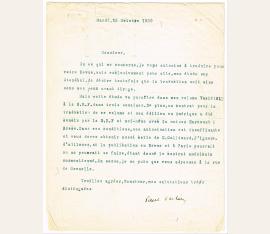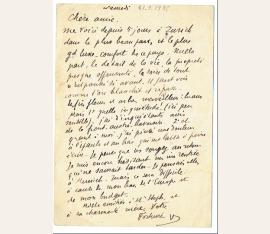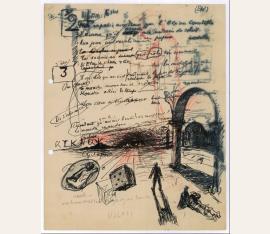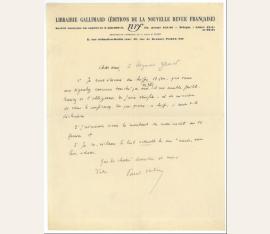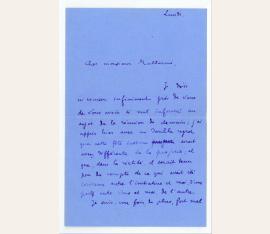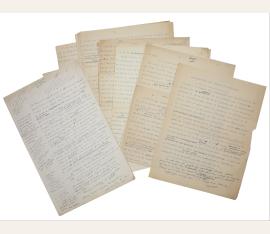Dichter und Essayist (1871-1945). 3 autograph letters signed. Paris und o. O. 2½ SS. (Gr.-)4to.
$ 1,930 / 1.800 €
(46982)
To [Eduard Titus], who wanted to publish some writings of Valéry in „This Quarter“: „Mes Notes sur la Poésie doivent être traduites en anglais par Miss Sylvia Beach [i. e. the pubisher of Joyce’s „Ulysses“ and owner of the book store] (Shakespeare & Co Rue de l’Odéon). Je ne puis que vous engager à vous adresser à elle en vue de la publication [...] Quant à mon opinion sur la traduction des Poèmes je n’ai pas le moindre temps [...] pour songe[r] à la rédiger en quelques pages.
Elle tiendrait d’ailleurs en six lignes [...]“ (1. X. 1929). – „[...] je vous autorise à traduire pour votre Revue, mais exclusivement pour elle, mon étude sur Stendhal. Je désire toutefois que la traduction soit mise sous mes yeux avant tirage. Mais cette étude va paraître dans mon volume Variété III à la N.R.F. dans trois semaines. De plus, un contrat pour la traduction de ce volume et son édition en Amérique a été conclu par la N.R.F. et moi-même avec la maison Harcourt & Brace. Dans ces conditions, mon autorisation est insuffisante et vous devez obtenir aussi celle de M. Gallimard [...]“ (15. X. 1929). – Partly with small damage to edges and old fold..
Dichter und Essayist (1871-1945). Autograph letter signed. Zürich. 8vo. 1 p.
$ 1,608 / 1.500 €
(62574)
To one "cher ami", i. e. "Raymond Gallimard", publisher of the "Nouvelle Revue française": "Je suis étonné du chire 12.500 - que vous me signelez comme touché par moi en 29. [...] J' aimerais savoir le montant de mon crédit au 10 fevrier [...] Je re-réclame le listé actuell de mes ›amis‹ avec leur adresses. Que de choses! Amities et merci | votre Paul Valery". - On stationery with headed paper of Librairie Gallimard; small traces of folding.
écrivain, poète et philosophe français (1871-1945). "Été". Autograph manuscript with some autogr. illustrations. S. l. n. d. Une feuille in-4 à double perforation, à l'encre noire. Quelques traits de crayon rouge. Importante décharge d'encre au verso due à une mouillure.
$ 13,400 / 12.500 €
(47107/BN31626)
A beautiful and witty manuscript illustrated with superb drawings of dreamlike and fantastic inspiration curiously evoking the universe of Salvador Dali. One can decipher in particular: "Girl, Aestus, exposed to the Gods, whom the ocean constellates [...]" (transl. from the French original). The poem, in the draft form, largely crossed out, carries in left and right margins the word "summer" which seems to be the title, but it differs totally from the work published under the same title published in the "Album des vers anciens" ("Album of ancient verses"), dedicated to Francis Vielé-Griffin.
Dichter und Essayist (1871-1945). Autograph letter signed. Paris. 1 S. Gr.-4to.
$ 1,930 / 1.800 €
(49329/BN33664)
To one "cher ami", i. e. "Raymond Gallimard", publisher of the "Nouvelle Revue française": "Je suis étonné du chire 12.500 - que vous me signelez comme touché par moi en 29. [...] J' aimerais savoir le montant de mon crédit au 10 fevrier [...] Je re-réclame le listé actuell de mes ›amis‹ avec leur adresses. Que de choses! Amities et merci | votre Paul Valery". - On stationery with headed paper of Librairie Gallimard; small traces of folding.
French poet and philosopher (1871-1945). Autograph letter signed. N. p. o. d. 8vo. 4 pp. on bifolium. With autograph envelope.
$ 6,968 / 6.500 €
(90155/BN59606)
Interesting and beautiful letter to Stéphane Mallarmé concerning a dinner in Mallarmé's honor that was scheduled for the day after. Valéry had organized the dinner in celebration of the publication of Mallarmé's essay-collection Divagations together with the so-called Mardistes, the artistic circle surrounding Mallarmé that would meet every Tuesday in the house of the poet. Despite his involvement in the organization, Valéry wrote to inform Mallarmé that the dinner would not be as intimate as planned, blaming the co-organizers: "j'ai appris hier avec un double regret que cette fête intime serait assez différente de la projetée ; et que, dans la réalité, il serait tenu peu de compte de ce qui avait été convenu entre l'initiative et moi, d’une part ; entre vous et moi, de l'autre." Therefore, he would even prefer not to attend this "random meeting", fearing that his feelings for Mallarmé might be offended by others: "Je vous avoue, mon cher maître, que je pense ne pas assister à un rendez-vous que je me trouve avoir indiqué trop vaguement.
Du reste, mes sentiments pour vous, pourraient eux-mêmes se trouver froissés à droite ou à gauche par je ne sais qui." Valéry had imagined a "dialogue between a certain group" and Mallarmé that has a "long association through reading and the Tuesdays" and could do without the "eternal restarts of the negotiations". Thus, he draws a "bitter philosophical conclusion, as is customary", wondering if this "incoherence between advice and execution" shows how little "the ideas of unity and continuous efforts" that produce "the rare new forms of thinking and of writing" have penetrated society, "even in an elite" and alludes to Edgar Allen Poe's "The Murders in the Rue Morgue", although misrepresenting Poe's allegorization of the Roman Goddess Laverna. - Paul Valéry's motives for backing out were more personally than he would admit in the letter. The Mardiste André-Ferdinand Hérold had invited Léon Dierx and Catulle Mendès against Vallery's wishes. Mendès, on the other hand, was offended as the invitation only reached him on the day before the dinner. Asking Mallarmé directly if he wished for him to come, the response must not have been very encouraging, as Mendès ultimately declined. Valéry didn't know about Mendès' decision when he wrote the letter at hand. Mallarmé responded with encouragement, asking Valéry to come for his sake and underlining that he did indeed remember what has been agreed upon. The dinner took place at the famous Cabaret du Père Lathuille in Batignolles. While Mallarmé was very pleased with the event, Claude Debussy was afraid that people might have noticed how bored he was, judging from the expression of his face. - Traces of folds. Well preserved..
French poet and philosopher (1871-1945). "Introduction aux images de la France". Autograph manuscript and typed manuscript with autograph annotations. N. p. o. d. 4to. French manuscript on paper. (3) pp. on 6 ff. Typescript: (18) pp. on 18 ff.
$ 9,112 / 8.500 €
(91653/BN60974)
Several drafts for Valéry's introduction to Martin Hürlimann's photo book "La France, architecture et paysages" (Zurich/Paris 1927), which was later published as part of Valéry's essay-collection "Regards sur le monde actuel" (Paris 1931). One of the typed pages re-uses a letter from 17 January 1927. - This beautiful ensemble of a manuscript and typescript with annotations and numerous corrections offers a rare insight into Paul Valéry's writing process. The text is an attempt at a profound characterization of France as a nation and its people.
Both the manuscript and the typescript comprise several versions of only a few paragraphs of the long introduction. The recurring first phrase of the manuscript is: "La France est le pays du monde où les considérations de la forme, le souci singulier de la forme en soi ait persisté, et même se soit imposé dans les temps modernes" ("France is the one country in the world where questions of form, the singular concern for form in itself, have persisted and even imposed themselves in modern times"). The unsystematically numbered typescript represents passages that are more descriptive of France as a country, trying to establish links between the people and their historical and natural environment. The different versions of the poetic first phrases depict France as harmonious in its geographical diversity: "La terre de France est remarquable par la netteté de sa figure, par les différences de ses parties, par l’équilibre général de cette diversité de régions qui se conviennent et se complètent. Une sorte de proportion assez heureuse existe dans ce pays entre la plaine et la hauteur, entre la montagne et la mer, entre l'étendue intérieure et le développement des côtes, et sur les côtes mêmes, entre les plages, les roches, les falaises [...]." - A beautiful condensation of Valéry's patriotic sentiments is a sentence added by hand to one of the typed pages: "La France tombe, se reléve, se restreint, reprend sa grandeur, redéchire soi-même se reconcentre" ("France falls, rises again, restrains herself, regains her greatness, tears herself apart again, refocuses"). Valéry revised and extended this phrase for the final version. - Stronger browning of the typescript and occasional tears. The first page of the manuscript is dust-stained, showing several minor tears. With editing marks in crayon..
